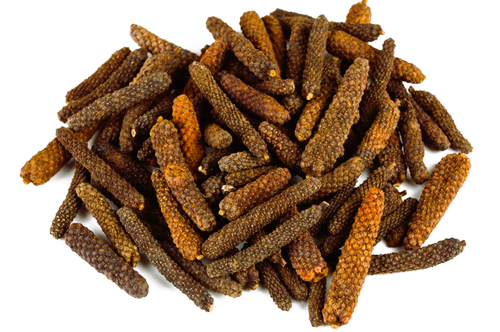Exploring the Potential Benefits of Pipli or pippali(Long Pepper): Traditional Uses and Modern Insights

Pipli or pippali, also known as long pepper or Piper longum, is a flowering vine that is native to South Asia. It has been used for centuries in traditional medicine systems like Ayurveda and traditional Chinese medicine. Here are some potential benefits associated with pipli:
- Digestive Health: Pipli is believed to support digestion by stimulating the production of digestive enzymes and promoting healthy gut function.
- Respiratory Health: It is used to address respiratory conditions like coughs, colds, and congestion. Pipli is thought to have expectorant properties that help clear mucus.
- Anti-inflammatory: Pipli may have anti-inflammatory properties that could potentially help with conditions involving inflammation.
- Antimicrobial: Some studies suggest that pipli may have antimicrobial properties, which could help in fighting off certain types of infections.
- Antioxidant: It contains compounds that act as antioxidants, which help protect cells from damage caused by free radicals.
- Weight Management: Pipli is sometimes used in traditional medicine for its potential to aid in weight loss and metabolism regulation.
- Pain Relief: It is believed to have analgesic properties and may be used to alleviate pain and discomfort.
- Menstrual Health: In traditional medicine, pipli has been used to address menstrual irregularities and support women’s reproductive health.
- Aphrodisiac: Some traditional systems of medicine suggest that pipli may have aphrodisiac properties and can be used to support sexual health.
- Cognitive Function: Pipli is sometimes used in Ayurvedic medicine to support cognitive function and memory.
- Adaptogenic: It is considered an adaptogenic herb in Ayurveda, which means it may help the body adapt to stress and support overall well-being.
- Anti-Asthmatic: In traditional medicine, pipli is sometimes used to help manage asthma symptoms.
- Enhanced Digestive Enzyme Production: Pipli is believed to stimulate the production of digestive enzymes, which can aid in the breakdown and absorption of nutrients from food.
- Detoxification: It is sometimes used in traditional medicine systems for its potential to support detoxification processes in the body.
- Improved Blood Circulation: Pipli may have properties that promote healthy blood flow, which can be beneficial for cardiovascular health.
- Joint Health: Some traditional uses of pipli suggest that it may help alleviate joint pain and inflammation, making it potentially useful for conditions like arthritis.
- Improved Appetite: It is thought to stimulate the appetite, making it potentially helpful for individuals with reduced appetite or digestive issues.
- Boosted Immune Function: Pipli’s potential antimicrobial properties may contribute to its use in traditional medicine for supporting the immune system.
- Warming Properties: In Ayurveda, pipli is considered to have a heating effect on the body, which can be beneficial for individuals with conditions associated with coldness or stagnation.
- Balancing Kapha Dosha: According to Ayurvedic principles, pipli is believed to balance the Kapha dosha, which is associated with qualities like heaviness, coldness, and congestion.
- Men’s Health Support: Pipli may be used traditionally to address specific men’s health concerns, although scientific evidence for this is limited.
- Topical Application: In some traditional practices, pipli paste or oil may be applied topically for conditions like muscle pain or skin issues.
- Anti-Aging Properties: Some proponents of traditional medicine systems suggest that pipli may have anti-aging benefits, though more research is needed to confirm this.
- Antifungal Properties: There is some research indicating that pipli may have antifungal properties, which could potentially be beneficial for addressing certain types of fungal infections.
- Traditional Culinary Use: Pipli is used as a spice in some cuisines, adding a unique flavor to dishes and potentially providing some of its health benefits.
Again, it’s important to emphasize that while pipli has a long history of traditional use, scientific research is ongoing, and more studies are needed to fully understand its potential benefits and mechanisms of action.




